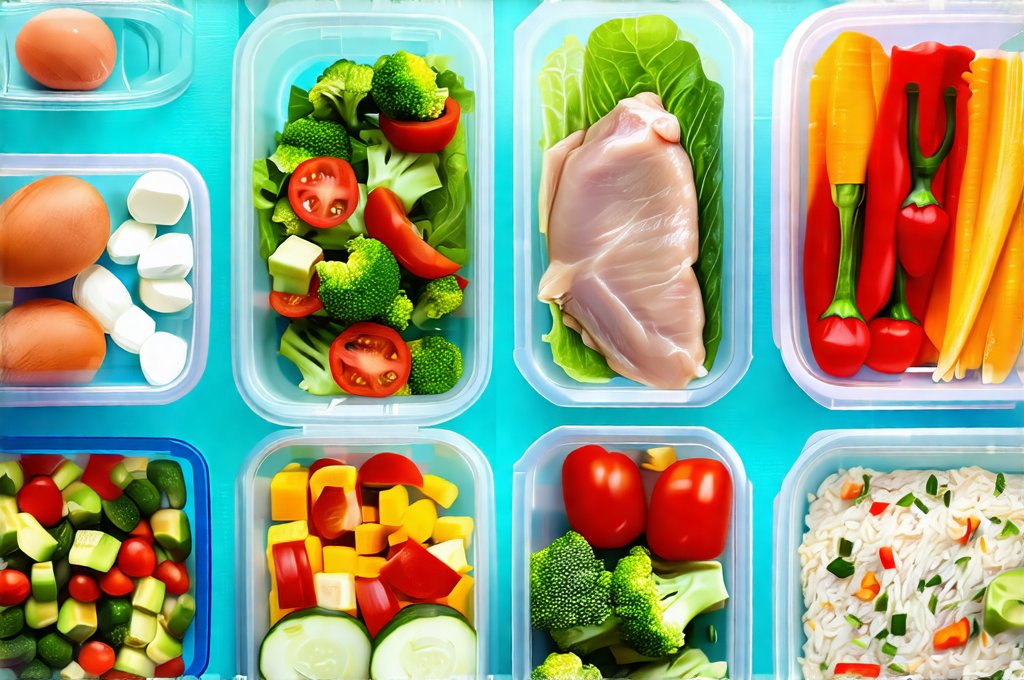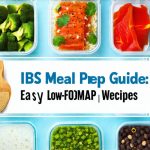Traveling with Irritable Bowel Syndrome (IBS) can be incredibly stressful, even for seasoned travelers. The disruption to routine, unfamiliar foods, and access to appropriate facilities often trigger flare-ups, turning what should be an enjoyable experience into a period of discomfort and anxiety. Many individuals with IBS find themselves severely limiting their travel options or avoiding them altogether, fearing the unpredictable nature of their condition when away from home. However, proactive planning, particularly around food, can significantly mitigate these risks and empower you to explore the world with greater confidence and peace of mind. This involves understanding your personal triggers, meticulously preparing meals and snacks, and being prepared for unexpected situations while on the go.
The key to successful travel meal prep for IBS lies in taking control of what you consume. Relying solely on restaurant options or airport food courts can be a gamble, as ingredient lists are often unavailable, and preparation methods may exacerbate symptoms. Packing your own carefully curated meals and snacks allows you to adhere to your dietary needs – whether that’s low-FODMAP, gluten-free, dairy-free, or another specific protocol – ensuring that you’re nourishing your body with foods that support digestive health. This isn’t about deprivation; it’s about empowerment and enjoying travel without the fear of discomfort. It’s also a fantastic way to save money and discover creative ways to enjoy healthy eating even when away from your usual kitchen setup. Understanding how to manage symptoms effectively can be greatly improved by learning more about K58.9 — IBS.
Building Your Travel Pantry: Essential Foods & Considerations
A well-stocked travel pantry is the cornerstone of IBS-friendly travel. Focus on non-perishable, easily transportable items that align with your individual dietary restrictions. Low-FODMAP options are often a good starting point for many individuals with IBS, but understanding your specific triggers is paramount. Think beyond just avoiding trigger foods; consider incorporating foods known to soothe the digestive system. For example, ginger chews can help alleviate nausea, and peppermint tea may reduce bloating. Here’s a breakdown of essential categories:
- Snacks: Rice cakes with peanut butter (check for xylitol-free!), small bags of gluten-free pretzels, plain popcorn, nuts & seeds (in moderation depending on tolerance), dried fruit (low FODMAP varieties like cranberries or blueberries).
- Breakfast: Instant oatmeal (ensure it’s certified gluten-free if necessary), travel-sized packets of almond milk or rice milk powder, protein bars specifically designed for sensitive stomachs.
- Meals: Dehydrated meals are an excellent option – look for brands that cater to dietary restrictions. Alternatively, pack pre-cooked quinoa or rice in airtight containers. Consider shelf-stable pouches of tuna or salmon (in water).
- Hydration: Carry a reusable water bottle and electrolyte tablets or powder to stay adequately hydrated, especially during travel.
When choosing packaging, prioritize lightweight, leakproof containers. Reusable silicone bags are excellent for snacks and smaller portions. Don’t forget essential condiments like salt, pepper, and a small bottle of olive oil (for adding flavor to meals). Remember that airline restrictions may apply to liquids, so check before you pack. It’s also wise to have a backup plan – knowing where to find supermarkets or health food stores at your destination can provide peace of mind if you run out of supplies or need to replenish stock. If you are planning on traveling and struggle with sensitive guts, remember what to pack.
Navigating Airport & Airplane Food Challenges
Airports and airplanes present unique challenges for IBS sufferers. Options are often limited, highly processed, and lack clear ingredient information. The combination of stress, altitude changes, and disrupted schedules can also contribute to digestive upset. Preparation is key. Don’t rely on the airline to accommodate your dietary needs; bring your own food. This allows you to avoid potential cross-contamination and ensures you have access to safe, comfortable choices.
Pre-security, many airports now offer healthier options in some restaurants or convenience stores. However, these can be expensive and may still contain hidden triggers. During the flight itself, politely inquire about ingredient lists if considering airline food but remain cautious. Be mindful of airplane air conditioning, which can be dehydrating, so sip water frequently. Consider bringing a small travel pillow to support good posture, as this can aid digestion. Avoid carbonated beverages, as they can contribute to bloating. Lastly, remember that even with the best preparation, unexpected flare-ups can occur. Be prepared with over-the-counter remedies like anti-gas medication or peppermint oil capsules (consult your doctor before using any medications). When considering dietary changes and supplements, it’s helpful to review dietary supplements.
Essential Packing Strategies for Food Safety
Maintaining food safety while traveling is crucial, especially when dealing with a sensitive digestive system. Proper packing and storage are essential to prevent contamination and spoilage.
- Temperature Control: Use insulated lunch bags or coolers with ice packs to keep perishable items at safe temperatures. Consider investing in reusable ice packs that can be frozen repeatedly.
- Airtight Containers: Pack food in airtight, leakproof containers to prevent spills and cross-contamination. Glass containers are durable but heavier; plastic containers are lighter but may absorb odors. Silicone bags are a versatile option for snacks and smaller portions.
- Separate Raw & Cooked Foods: If you’re packing cooked foods alongside raw ingredients (like fruit), keep them separate to prevent bacterial transfer.
It’s wise to understand motility scans if you suspect digestive issues are impacting your travel plans. It’s also important to be mindful of food storage conditions at your destination. If staying in a hotel, inquire about the availability of a mini-fridge or kitchenette. When traveling internationally, be cautious about tap water and ice; use bottled water instead. Always wash your hands thoroughly before handling food. Don’t hesitate to discard any food that looks or smells questionable – it’s better to be safe than sorry.
Dealing with Restaurant Meals & Hidden Triggers
Even with meticulous meal prep, you may occasionally need to eat at restaurants while traveling. This requires a strategic approach and careful communication. Research menus online beforehand if possible, looking for options that align with your dietary needs. Don’t be afraid to ask questions – politely inquire about ingredients and preparation methods. Explain your dietary restrictions clearly to the server. Be specific: instead of saying “I’m gluten-free,” say “I need a meal completely free from wheat, barley, and rye.”
Hidden triggers are common in restaurant meals. For example, many sauces contain garlic or onion, even if not listed on the menu. Cross-contamination is also a risk – food may be prepared near ingredients that trigger your symptoms. Consider ordering simple dishes with minimal ingredients and asking for modifications (e.g., sauce on the side). If you’re unsure about an ingredient, it’s best to avoid it. Carry emergency snacks in case suitable options are limited or unavailable. A low-FODMAP diet can be incredibly helpful when navigating restaurant choices.
Creating a Travel First-Aid Kit for IBS Flare-Ups
A well-equipped travel first-aid kit can provide peace of mind and help manage unexpected flare-ups. Beyond standard items like bandages and antiseptic wipes, include these specific supplies:
- Medications: Any prescription medications you take regularly, plus over-the-counter remedies for common IBS symptoms (anti-diarrheal medication, anti-gas medication, peppermint oil capsules). Always consult your doctor before taking any new medications.
- Digestive Aids: Probiotics can help restore gut balance after disruptions. Consider bringing a travel-sized bottle of digestive enzymes to aid in food breakdown. Understanding when you might feel worse starting probiotics can help prepare for adjustments.
- Soothing Teas: Peppermint or ginger tea can alleviate nausea and bloating. Pack individual teabags for convenience.
- Comfort Items: A heating pad or hot water bottle can soothe abdominal cramps. Portable hand warmers are also useful.
- Electrolyte Replacements: Tablets or powder to replenish fluids lost during diarrhea or vomiting.
It’s wise to create a list of local pharmacies and medical facilities at your destination, in case you need to seek professional help. Keep a copy of this information with your travel documents. Remember that managing IBS while traveling requires proactive planning and self-awareness. By taking control of your diet, packing strategically, and being prepared for unexpected challenges, you can minimize symptoms and enjoy the freedom of exploration without fear or anxiety.


















